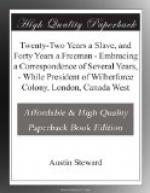But why, oh why, had I been forced to flee thus from my fellow men? I was guilty of no crime; I had committed no violence; I had broken no law of the land; I was not charged even with a fault, except of the love of liberty and a desire to be free! I had claimed the right to possess my own person, and remove it from oppression. Oh my God, thought I, can the American People, who at this very hour are pouring out their blood in defence of their country’s liberty; offering up as a sacrifice on the battle field their promising young men, to preserve their land and hearthstones from English oppression; can they, will they, continue to hunt the poor African slave from their soil because he desires that same liberty, so dear to the heart of every American citizen? Will they not blot out from their fair escutcheon the foul stain which Slavery has cast upon it? Will they not remember the Southern bondman, in whom the love of freedom is as inherent as in themselves; and will they not, when contending for equal rights, use their mighty forces “to break every yoke, and let the oppressed go free?” God grant that it may be so!
As soon as I thought it prudent, I pursued my journey, and finally came out into the open country, near the dwelling of Mr. Dennis Comstock, who, as I have said, was president of the Manumission Society. To him I freely described my situation, and found him a friend indeed. He expressed his readiness to assist me, and wrote a line for me to take to his brother, Otis Comstock, who took me into his family at once. I hired to Mr. Comstock for the season, and from that time onward lived with him nearly four years.
When I arrived there I was about twenty-two years of age, and felt for the first time in my life, that I was my own master. I cannot describe to a free man, what a proud manly feeling came over me when I hired to Mr. C. and made my first bargain, nor when I assumed the dignity of collecting my own earnings. Notwithstanding I was very happy in my freedom from Slavery, and had a good home, where for the first time in my life I was allowed to sit at table with others, yet I found myself very deficient in almost every thing which I should have learned when a boy.
These and other recollections of the past often saddened my spirit; but hope ,—cheering and bright, was now mine, and it lighted up the future and gave me patience to persevere.
In the autumn when the farm work was done, I called on Mr. Comstock for some money, and the first thing I did after receiving it I went to Canandaigua where I found a book-store kept by a man named J.D. Bemis, and of him I purchased some school books.
No king on his throne could feel prouder or grander than I did that day. With my books under my arm, and money of my own earning in my pocket, I stepped loftily along toward Farmington, where I determined to attend the Academy. The thought, however, that though I was twenty-three years old, I had yet to learn what most boys of eight years knew, was rather a damper on my spirits. The school was conducted by Mr. J. Comstock, who was a pleasant young man and an excellent teacher. He showed me every kindness and consideration my position and ignorance demanded; and I attended his school three winters, with pleasure and profit to myself at least.




